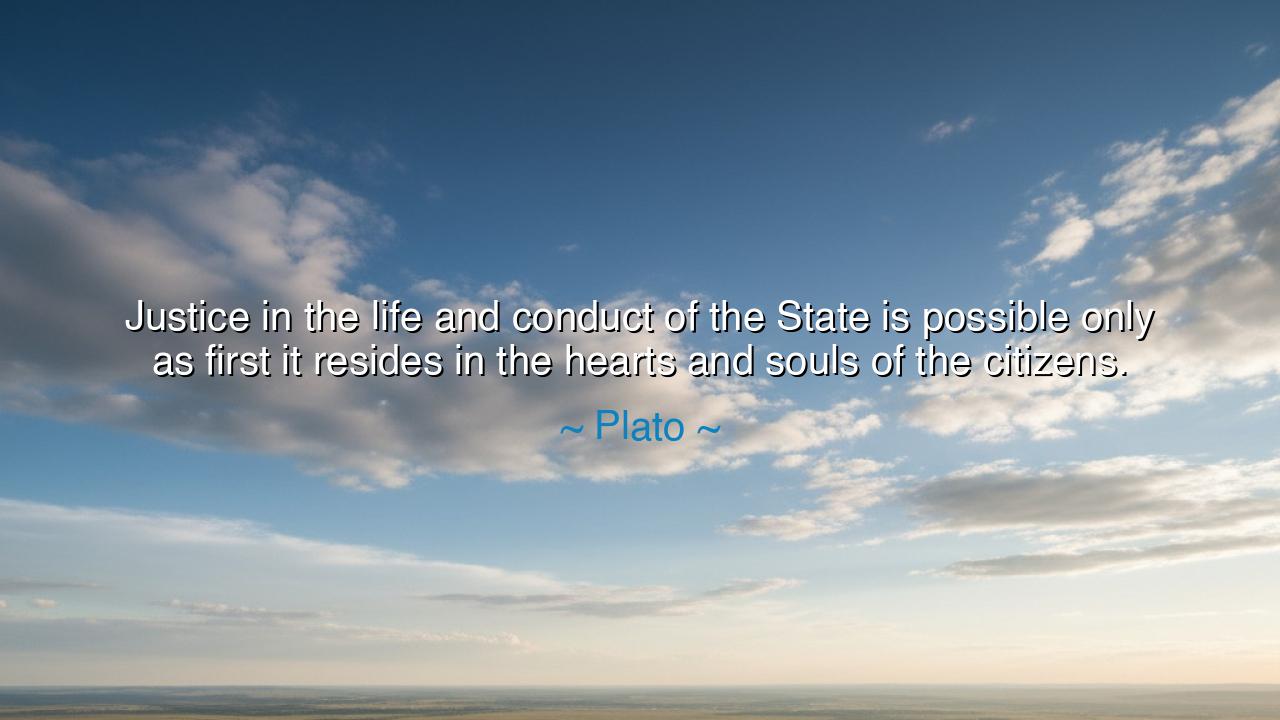
Justice in the life and conduct of the State is possible only as
Justice in the life and conduct of the State is possible only as first it resides in the hearts and souls of the citizens.






Hear the eternal words of Plato, the philosopher of Athens, who declared: “Justice in the life and conduct of the State is possible only as first it resides in the hearts and souls of the citizens.” This is no light saying, but a principle carved into the very foundation of civilization. For the State is not a thing apart from its people—it is the mirror of their virtues and their vices. If corruption festers in the hearts of men, corruption will rule their governments. If fairness and truth live within their souls, then justice shall flourish in their laws and courts.
Plato, in his great work The Republic, spoke much of justice as the harmony of all parts, both in the soul of man and in the life of the city. He saw the State as a reflection of its citizens: as the soul governs the body, so too do the people’s virtues govern their institutions. To expect rulers to be just when the citizens themselves are deceitful, greedy, or indifferent is folly. For leaders rise out of the soil of their people, and if the soil is tainted, so too will the fruit be bitter.
Consider the fall of Rome, once the mightiest of empires. While its laws and legions were strong, corruption took root in the hearts of its citizens. Luxury overcame duty, greed overcame honor, and soon its leaders reflected that same decay. Rome did not collapse from the strength of its enemies alone, but from the weakness of its own soul. This history cries aloud the truth of Plato’s wisdom: no State can remain just if its people do not cultivate justice within themselves.
Yet the opposite also shines brightly in history. Think of Mahatma Gandhi and the people of India, who through discipline, restraint, and moral conviction brought down the power of the British Empire. Their State of independence was not founded first in laws or armies, but in the hearts of citizens who believed in truth, nonviolence, and justice. They became the embodiment of Plato’s teaching, proving that when justice is rooted in the soul, it can transform even the mightiest political order.
The lesson is clear: do not wait for rulers, courts, or laws to impose justice upon you from above. Instead, plant it in your heart. Be honest in your dealings, fair in your judgments, and compassionate in your actions. When many live this way, the State itself will grow to reflect such virtues. But when citizens neglect their inner duty, hoping the government will provide what they themselves lack, the nation falls into decay.
Practical action begins with small deeds: keep your word even when it costs you; defend the weak when you have power; resist the lure of greed when you could profit unjustly. Teach your children that justice is not only found in books or courts, but in how they treat their neighbors, their workers, and strangers upon the road. For these small acts, multiplied by thousands, become the great justice of nations.
So let Plato’s wisdom echo through the ages: justice begins not in palaces or parliaments, but in the souls of ordinary men and women. If you wish your State to be just, then first make your own heart a kingdom of fairness, compassion, and truth. For a nation is nothing more than the collective soul of its people, and when those souls burn brightly with virtue, no darkness can overcome them.






AAdministratorAdministrator
Welcome, honored guests. Please leave a comment, we will respond soon